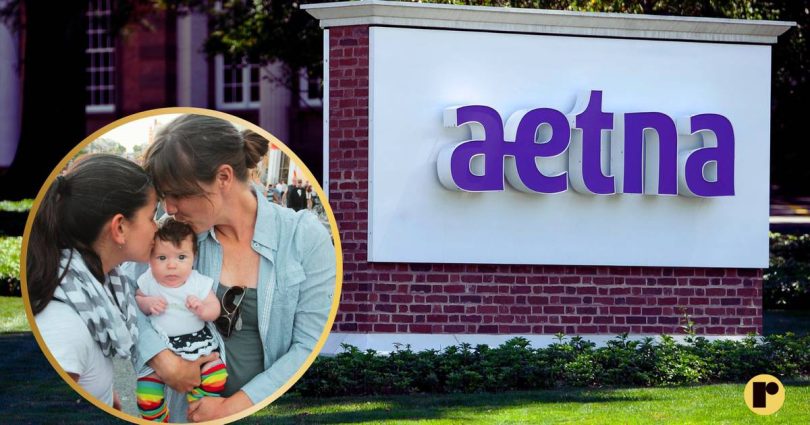One major step closer towards building families, health insurance company Aetna will now cover fertility treatments for LGBTQ couples in New York, following a lawsuit settlement last week.
The settlement was reached on May 3, having been originally filed in Sept. 2021 on behalf of the gender equity organization National Women’s Law Center (NWLC) and Emery Celli Brinckerhoff Abady Ward & Maazel (ECBAWM) LLP against Aetna in the U.S. District Court for the Southern District of New York.
The class action lawsuit, Goidel et al. v. Aetna, deemed that Aetna’s fertility coverage provided inequitable access to LGBTQ couples who seek fertility treatment, while straight couples who struggled to become pregnant after six to 12 months of attempted intercourse have been eligible for fertility treatment coverage. Meanwhile, queer couples have had to pay out-of-pocket six to 12 rounds of artificial insemination before being deemed eligible for coverage of in-vitro fertilization or additional insemination rounds.
Additionally, Aetna will pay out $2 million to members affected by the exclusive former policy. The insurance company will also re-process eligible insurance claims to reimburse members for their out-of-pocket artificial insemination cycles up to the limits of the coverage plan.
“We celebrate this significant stride toward achieving justice for LGBTQ+ people who have faced obstacle after obstacle trying to access the health care services that they need to build their families,” said NWLC’s senior litigation counsel for reproductive rights and health Alison Tanner in a statement on May 3. “We are eager to identify all affected class members, and we remain dedicated to advocating for equal access to fertility treatments for everyone, regardless of their sexual orientation or gender identity.”
While Aetna is proactive about tending to the damages caused by its previous policy, time will tell the magnitude of effect this policy change will have on not only Aetna plans outside of New York, but on all insurance companies overall.
Most states do not have fertility insurance laws of any kind, with only seven states requiring coverage for same-sex couples, making this settlement an even more important step to make fertility benefits widespread and more available.
Colorado, Delaware, Illinois, Maine, Maryland, and New Jersey are amongst New York’s companies regarding states that provide inclusive coverage. In addition, more self-insured employers across the country are providing inclusive fertility coverage “because it’s good for their employees and good for business,” said Betsy Campbell, chief engagement officer of the national infertility association RESOLVE.
Campbell adds that it is incumbent on employees to point out any gaps in fertility coverage to their employers as well as advocate for inclusive family building benefits.
“We have seen time and time again that one person making the ask can make a difference,” she said, alluding to New York City’s pending class action lawsuit that could have ramifications outside of the city.
In the lawsuit against New York City, a gay couple claims that the city’s health care plan has “categorically excluded” gay male insurance holders from receiving IVF benefits, even though the benefits are extended to those in different-sex relationships, single women and women in same-sex relationships.
Out-of-pocket costs are the biggest barriers to healthcare, and “anything that reduces costs will mean more people can access the care they need to have the families they dream of and deserve,” Campbell said.
Like many insurers whose individual policies have huge ramifications for the industry at large, Aetna’s policy change makes Eric Abrams—an associate at ECBAWM and a co-counsel on the case who is non-binary and uses gender-neutral pronouns—hopeful.
Abrams credits Aetna for taking on the settlement and leading by example with the changes they’re implementing because “they’re a huge player in this space,” they said.
“One would hope that folks who see the kind of comprehensive coverage that Aetna is giving are going to pressure their employers to use Aetna, and doctors are going to hopefully look at Aetna as an example of an insurance company that’s doing it right,” Abrams told Reckon, speculating on the ripple effect that could come out of the settlement.
They add that they hope other insurers are going to take notice of the changing landscape of LGBTQ-inclusive healthcare coverage, and that despite Aetna only being one company, change starts somewhere.
“I definitely hope we end up in a landscape where fertility coverage is equal regardless sexual orientation,” they said. “Getting to a result like this has made me more optimistic that there’s some good change and progress that we’re making.”
Assuming the federal judge approves the new deal, the settlement will proceed to begin its roll out on June 1 for Aetna’s New York members. And while the clinical policy currently only applies to New York, there is high probability that the policy will be followed by Aetna in all states.







